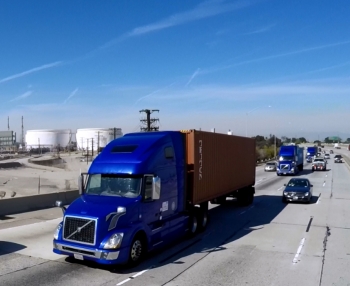Volvo displays truck platooning in California
LOS ANGELES, CA – Volvo Trucks, alongside Partners for Advanced Transportation Technology (PATH) from the University of California in Berkeley, successfully demonstrated partially automated highway truck platooning in a real world simulation last Wednesday.

With only 50 feet between one another, three Volvo VNL 670 tractors, each hauling a cargo container, travelled at speeds of 55 miles per hour along Los Angeles’ Interstate 110 in a simulation to showcase Volvo and PATH’s Cooperative Adaptive Cruise Control (CACC) technology.
CACC is an enhanced version of Adaptive Cruise Control(ACC) technology that allows closer and more accurate control of the gap between trucks with improved safety.
With no interference from the driver, the vehicles maintained steady platoon speed and spacing with the aid of forward-looking sensors and vehicle-to-vehicle communication.
“Truck platooning can benefit freight companies and professional drivers alike through safer, more fuel-efficient operations,” said Magnus Koeck, vice president of marketing and brand management for Volvo Trucks. “Vehicle-to-vehicle communication is pivotal for platooning systems; it helps reduce the reaction time for braking and enables vehicles to follow closer. Reducing the traveling distance between vehicles not only reduces the aerodynamic drag, but also allows for greater highway utilization, thereby helping to alleviate traffic congestion.”
According to Volvo, platooning using CACC technology allows benefits like faster responses to hard braking while maintaining safety, superior longitude control while following a line, reduced emissions, and better traffic flow.
Volvo says CACC technology makes platooning possible and is not meant to replace the driver but instead, serve as an aid for skilled professional drivers.
CACC is being developed in partnership with PATH and has been sponsored by the U.S. Department of Transportation’s Federal Highway Administration Advanced Research Program and Caltrans.
Photo courtesy of Volvo
Have your say
This is a moderated forum. Comments will no longer be published unless they are accompanied by a first and last name and a verifiable email address. (Today's Trucking will not publish or share the email address.) Profane language and content deemed to be libelous, racist, or threatening in nature will not be published under any circumstances.